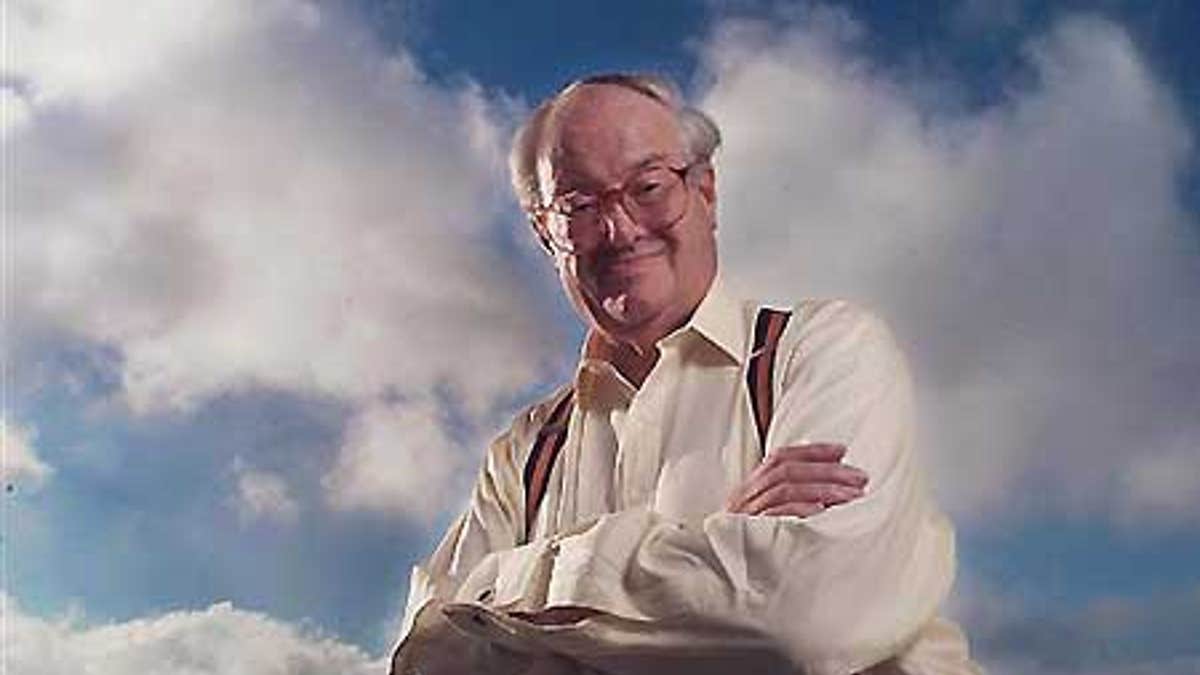
LONDON – British lawyer and writer John Mortimer, creator of the curmudgeonly criminal lawyer Rumpole of the Bailey, died Friday. He was 85.
Mortimer's family said he died early in the morning at his home in the Chiltern Hills northwest of London, with his wife and children at his side. They did not disclose the cause of death.
Mortimer combined a career as a lawyer with a large literary output that included dozens of screen and stage plays and radio dramas. His most famous creation was Horace Rumpole, a cigar-smoking, wine-loving barrister who appeared in a TV series and a string of novels and stories.
"It's hard to think he's gone," said Tony Lacey, Mortimer's editor at publisher Viking. "At least we're lucky enough to have Rumpole to remind us just how remarkable he was."
Born April 21, 1923, and educated at Oxford University, Mortimer qualified as a lawyer in the 1940s and worked as a barrister in the British courts.
A lifelong supporter of Britain's Labour Party and self-proclaimed "champagne socialist," Mortimer took up several high profile freedom of speech cases. He defended Penguin, the publisher of D.H. Lawrence's "Lady Chatterley's Lover," against obscenity charges in the 1960s, and later represented the radical magazine Oz at an obscenity trial and defended Gay News magazine against a blasphemy charge.
His legal career took in everything from divorce cases to murders — and he said he preferred the latter.
"Matrimonial clients hate each other so much and use their children to hurt each other in beastly ways," he once said. "Murderers have usually killed the one person in the world that was bugging them and they're usually quite peaceful and agreeable."
Mortimer combined legal and literary careers for years, writing early in the morning before heading off to court. He published his first novel in 1947 and produced a stream of plays and radio dramas from the 1950s.
His work included understated and poignant dramas such as "A Voyage Round My Father," a play inspired by his relationship with his own lawyer father that was filmed with Alan Bates and Laurence Olivier.
He wrote screenplays for film and television, including the 1981 television adaptation of Evelyn Waugh's "Brideshead Revisited," one of the decade's biggest TV hits.
His novels included the "Titmuss" trilogy about the rise of an ambitious Thatcherite politician named Leslie Titmuss.
But his most popular creation by far was Rumpole, the barrister and bon vivant who would take on any case, and usually triumphed. Played on television by Leo McKern, Rumpole had a passion for the underdog, a love of poetry and a wife he referred to as "she who must be obeyed."
In a series of stories and shows beginning in the 1970s, Rumpole applied his motto "never plead guilty" to cases that touched on issues from fox hunting to alternative lifestyles, child abuse to devil worship.
Despite his left-wing principles, Mortimer's views were idiosyncratic. He supported fox hunting and the monarchy, was skeptical of feminism and once said he believed in every aspect of religion except God.
A noted raconteur and wit, he was famous for his trademark owlish glasses and his one-liners.
"No brilliance is required in law," he once said. "Just common sense and relatively clean fingernails."
Mortimer was knighted by Queen Elizabeth II in 1998.
Mortimer had a son and a daughter from his marriage to writer Penelope Mortimer, which ended in divorce in 1972. She died in 1999.
He later married Penelope Gollop, and had two daughters, including actress Emily Mortimer.
In 2004 Mortimer disclosed he had recently learned he had a fifth child — a son, Ross, from a 1960s affair with actress Wendy Craig. Craig and her husband raised the boy and did not tell Mortimer he was the father for more than 40 years.
Mortimer's wife and children survive him.
Funeral details were not immediately available.














































